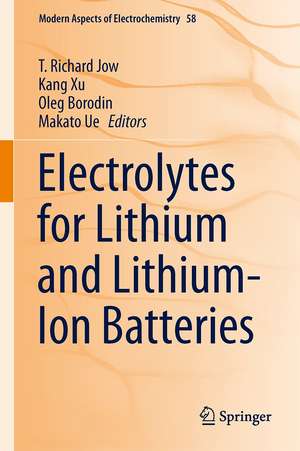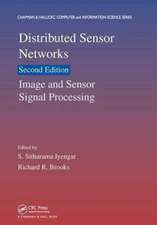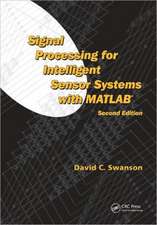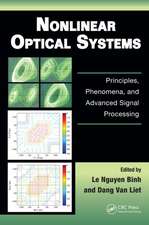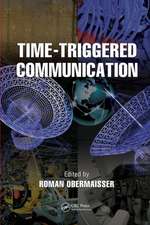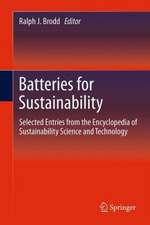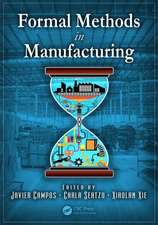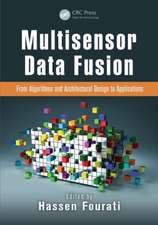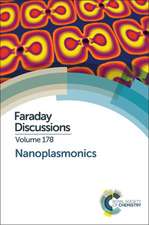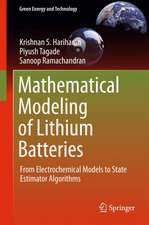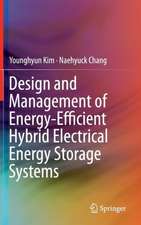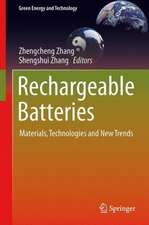Electrolytes for Lithium and Lithium-Ion Batteries: Modern Aspects of Electrochemistry, cartea 58
Editat de T. Richard Jow, Kang Xu, Oleg Borodin, Makoto Ueen Limba Engleză Hardback – 7 mai 2014
| Toate formatele și edițiile | Preț | Express |
|---|---|---|
| Paperback (1) | 1502.88 lei 38-45 zile | |
| Springer – 3 sep 2016 | 1502.88 lei 38-45 zile | |
| Hardback (1) | 1234.77 lei 6-8 săpt. | |
| Springer – 7 mai 2014 | 1234.77 lei 6-8 săpt. |
Din seria Modern Aspects of Electrochemistry
-
 Preț: 388.13 lei
Preț: 388.13 lei -
 Preț: 393.13 lei
Preț: 393.13 lei - 18%
 Preț: 1234.14 lei
Preț: 1234.14 lei - 18%
 Preț: 961.55 lei
Preț: 961.55 lei -
 Preț: 396.40 lei
Preț: 396.40 lei - 18%
 Preț: 1224.99 lei
Preț: 1224.99 lei - 18%
 Preț: 956.69 lei
Preț: 956.69 lei - 18%
 Preț: 1236.06 lei
Preț: 1236.06 lei - 15%
 Preț: 643.34 lei
Preț: 643.34 lei - 18%
 Preț: 950.66 lei
Preț: 950.66 lei - 15%
 Preț: 707.31 lei
Preț: 707.31 lei - 15%
 Preț: 640.71 lei
Preț: 640.71 lei - 18%
 Preț: 946.10 lei
Preț: 946.10 lei - 18%
 Preț: 944.51 lei
Preț: 944.51 lei - 23%
 Preț: 780.09 lei
Preț: 780.09 lei - 18%
 Preț: 951.29 lei
Preț: 951.29 lei - 18%
 Preț: 1827.32 lei
Preț: 1827.32 lei - 18%
 Preț: 945.92 lei
Preț: 945.92 lei
Preț: 1234.77 lei
Preț vechi: 1505.82 lei
-18% Nou
Puncte Express: 1852
Preț estimativ în valută:
236.27€ • 246.68$ • 195.55£
236.27€ • 246.68$ • 195.55£
Carte tipărită la comandă
Livrare economică 04-18 aprilie
Preluare comenzi: 021 569.72.76
Specificații
ISBN-13: 9781493903016
ISBN-10: 1493903012
Pagini: 496
Ilustrații: XVIII, 476 p. 300 illus., 130 illus. in color.
Dimensiuni: 155 x 235 x 32 mm
Greutate: 1.09 kg
Ediția:2014
Editura: Springer
Colecția Springer
Seria Modern Aspects of Electrochemistry
Locul publicării:New York, NY, United States
ISBN-10: 1493903012
Pagini: 496
Ilustrații: XVIII, 476 p. 300 illus., 130 illus. in color.
Dimensiuni: 155 x 235 x 32 mm
Greutate: 1.09 kg
Ediția:2014
Editura: Springer
Colecția Springer
Seria Modern Aspects of Electrochemistry
Locul publicării:New York, NY, United States
Public țintă
ResearchCuprins
Nonaqueous Electrolytes with Advances in Salts.- Nonaqueous Electrolytes with Advances in Solvents.- Nonaqueous Electrolytes and Advances in Additives.-Ionic Liquids.- Interphases between Electrolytes and Anodes in Li-ion Battery.- On the Surface Chemistry of Cathode Materials in Li-ion Batteries.- Tools and Methodologies for Characterization of Electrode-Electrolyte Interfaces.- Molecular Modeling of Electrolytes.- Prediction of Electrolyte and Additive Electrochemical Stabilities.- Aprotic Electrolytes in Li-Air Batteries.
Recenzii
From the book reviews:
“This book provides an excellent guide to the plethora of salt, electrolyte and additive options and their functionalities and properties; the historical overview is also particularly helpful to those who are new to the field. … this book will be useful to battery researchers in academia and industry, providing historical context, reference information on a wide range of electrolyte components and their functionality and highlighting directions for further work and the challenges that lie ahead.” (Sarah Ball,Johnson Matthey Technology Review,Vol. 59 (1), 2015)
“This book provides an excellent guide to the plethora of salt, electrolyte and additive options and their functionalities and properties; the historical overview is also particularly helpful to those who are new to the field. … this book will be useful to battery researchers in academia and industry, providing historical context, reference information on a wide range of electrolyte components and their functionality and highlighting directions for further work and the challenges that lie ahead.” (Sarah Ball,Johnson Matthey Technology Review,Vol. 59 (1), 2015)
Notă biografică
Dr. T. Richard Jow is an ARL Fellow and Team Lead for Energy Storage Materials at the U.S. Army Research Laboratory in Adelphi, MD. His work focuses on the development of energy storage materials and devices, including high energy and high power density rechargeable lithium batteries and dielectric capacitors. He has been technical lead for the DOE-ARL joint electrolyte development program since 1999 and managed and co-managed the Army ManTech Programs on Capacitors and Li-ion Batteries, respectively. Before joining ARL in 1989, Dr. Jow was a senior chemist at Allied-Signal in Morristown, NJ, and a senior scientist at Electrochem Industries, a subsidiary of Wilson Greatbatch Limited, in Clarence, NY, developing various electrode and electrolyte materials for high energy density lithium batteries. He received his B.S. and M.S. in Physics from National Tsing Hua University and his Ph.D. in Materials Science and Engineering from Northwestern University. He has authored or co-authored over 130 journal papers and 25 patents in the areas of lithium batteries, electrochemical capacitors, and dielectric capacitors. He is a member of the Electrochemical Society and the Materials Research Society.
Kang Xu has been doing research on energy storage technologies for over 20 years. He joined U.S. Army Research Laboratory in 1997, and has been the PI/co-PI for electrolyte projects funded under US DOE Advanced Battery Research, the project leads for various DoD research projects, as well as the Contract Official Technical Representative for diversified research initiatives. His research interests cover materials development and interphasial mechanisms for electrochemical energy storage devices, including lithium and advanced battery chemistries. His recent activities also extend to emerging fronts of bio/nano-structured materials based on viral templates, and their applications in advanced battery chemistries and energy harvesting throughphotosynthetic routes, for which he acts as technical leads in DoD-funded programs. He has been recognized four times by R&D Achievement Awards from the Department of the Army (1999, 2001, 2002 and 2011), the Publication Award (2005), the Army Science Conference Best Paper Award (2008) and the Science Award (2011). He has published over 130 papers in peer-reviewed journals (h-index 43), written 2 book chapters, co-edited a book and currently holds 18 issued U. S. patents. He is an active member of the Electrochemical Society and Materials Research Society.
Oleg Borodin works as a scientist at the Electrochemistry Branch of the Army Research Laboratory, Adelphi, MD since 2011. After obtained a Ph. D. degree in Chemical Engineering in 2000 he worked in the area of multiscale modeling of liquid, ionic liquid and polymer electrolytes for battery and double layer capacitor applications, modeling of energetic composite materials, polymers in solutions, and polymer nanocomposites. He co-authored more than a hundred publications and four book chapters. His modeling efforts focus on the scales from electronic to atomistic and mesoscale.
Dr. Makoto Ue is a vice president and Energy 2 lab manager of Corporate R&D Center at Samsung SDI, Ltd. in Suwon, Korea. He obtained his M.S. and Ph.D. from The University of Tokyo, Japan in 1981 and 1995, respectively, and studied at the University of Pittsburgh and Lawrence Berkeley National Laboratory, USA from 1988 to 1990. He worked for Tsukuba Research Center at Mitsubishi Chemical Corporation, Japan from 1981 to 2010 as the first researcher of nonaqueous electrolyte solutions (1984), the first top manager of Battery Materials Laboratory (2003-2010), the top manager of Tsukuba Research Center (2006-2010), a fellow (2007-2012), and then an adjunct researcher at National Institute for Materials Science (2011-2012). He has contributed to the growth of Li battery and capacitor industries through hissteady electrolyte research and his products have been adopted in these devices for consumer and automotive applications. Dr. Ue holds about 300 papers/reviews/book chapters and about 300 patents, and is the recipient of seven academic awards including Outstanding Research Paper Award from The Electrochemical Society of Japan (1994), Research Award from International Battery Materials Association (1997), and Battery Division Technology Award from the Electrochemical Society (2004) in Li-battery fields.
Kang Xu has been doing research on energy storage technologies for over 20 years. He joined U.S. Army Research Laboratory in 1997, and has been the PI/co-PI for electrolyte projects funded under US DOE Advanced Battery Research, the project leads for various DoD research projects, as well as the Contract Official Technical Representative for diversified research initiatives. His research interests cover materials development and interphasial mechanisms for electrochemical energy storage devices, including lithium and advanced battery chemistries. His recent activities also extend to emerging fronts of bio/nano-structured materials based on viral templates, and their applications in advanced battery chemistries and energy harvesting throughphotosynthetic routes, for which he acts as technical leads in DoD-funded programs. He has been recognized four times by R&D Achievement Awards from the Department of the Army (1999, 2001, 2002 and 2011), the Publication Award (2005), the Army Science Conference Best Paper Award (2008) and the Science Award (2011). He has published over 130 papers in peer-reviewed journals (h-index 43), written 2 book chapters, co-edited a book and currently holds 18 issued U. S. patents. He is an active member of the Electrochemical Society and Materials Research Society.
Oleg Borodin works as a scientist at the Electrochemistry Branch of the Army Research Laboratory, Adelphi, MD since 2011. After obtained a Ph. D. degree in Chemical Engineering in 2000 he worked in the area of multiscale modeling of liquid, ionic liquid and polymer electrolytes for battery and double layer capacitor applications, modeling of energetic composite materials, polymers in solutions, and polymer nanocomposites. He co-authored more than a hundred publications and four book chapters. His modeling efforts focus on the scales from electronic to atomistic and mesoscale.
Dr. Makoto Ue is a vice president and Energy 2 lab manager of Corporate R&D Center at Samsung SDI, Ltd. in Suwon, Korea. He obtained his M.S. and Ph.D. from The University of Tokyo, Japan in 1981 and 1995, respectively, and studied at the University of Pittsburgh and Lawrence Berkeley National Laboratory, USA from 1988 to 1990. He worked for Tsukuba Research Center at Mitsubishi Chemical Corporation, Japan from 1981 to 2010 as the first researcher of nonaqueous electrolyte solutions (1984), the first top manager of Battery Materials Laboratory (2003-2010), the top manager of Tsukuba Research Center (2006-2010), a fellow (2007-2012), and then an adjunct researcher at National Institute for Materials Science (2011-2012). He has contributed to the growth of Li battery and capacitor industries through hissteady electrolyte research and his products have been adopted in these devices for consumer and automotive applications. Dr. Ue holds about 300 papers/reviews/book chapters and about 300 patents, and is the recipient of seven academic awards including Outstanding Research Paper Award from The Electrochemical Society of Japan (1994), Research Award from International Battery Materials Association (1997), and Battery Division Technology Award from the Electrochemical Society (2004) in Li-battery fields.
Textul de pe ultima copertă
Electrolytes for Lithium and Lithium-ion Batteries provides a comprehensive overview of the scientific understanding and technological development of electrolyte materials in the last several years. This book covers key electrolytes such as LiPF6 salt in mixed-carbonate solvents with additives for the state-of-the-art Li-ion batteries as well as new electrolyte materials developed recently that lay the foundation for future advances. This book also reviews the characterization of electrolyte materials for their transport properties, structures, phase relationships, stabilities, and impurities. The book discusses in-depth the electrode-electrolyte interactions and interphasial chemistries that are key for the successful use of the electrolyte in practical devices. The Quantum Mechanical and Molecular Dynamical calculations that has proved to be so powerful in understanding and predicating behavior and properties of materials is also reviewed in this book. Electrolytes for Lithium and Lithium-ion Batteries is ideal for electrochemists, engineers, researchers interested in energy science and technology, material scientists, and physicists working on energy.
Caracteristici
The only up-to-date book that focuses on electrolytes for lithium and lithium-ion batteries Discusses methods of characterization electrolyte-electrode interphasial chemistry, and the use of computational chemistry Provides a comprehensive review of recent advances covering all aspects of the electrolytes Includes supplementary material: sn.pub/extras
